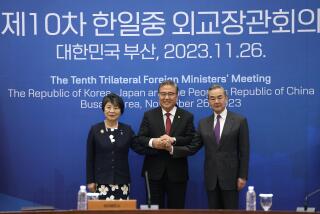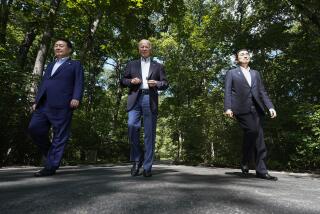DIPLOMACY : New Era of Cooperation Will Be Goal of U.S.-Japan Summit
- Share via
TOKYO — A new emphasis on U.S.-Japan cooperation to achieve shared goals in the post-Cold War world is likely to emerge from a Washington summit Wednesday between Japanese Prime Minister Tomiichi Murayama and President Clinton.
After a year in which bilateral relations were dominated by trade disputes, the world’s two economic superpowers now want to stress their desire to work together to address regional and global problems.
The failure of former Prime Minister Morihiro Hosokawa and Clinton to reach agreement on trade issues at a Washington summit in February provoked a sense of crisis in bilateral relations.
But a fresh tone began to emerge after progress was achieved in the fall on resolving some trade disputes. Fear that North Korea may develop nuclear weapons has also prompted renewed attention to security concerns, which formed the heart of U.S.-Japan relations from the 1950s through the 1970s.
A key topic of summit discussion will be Japanese financial assistance in implementing a Washington-Pyongyang agreement intended to forestall any North Korean production of nuclear arms.
Japan hopes this will be part of a new era of cooperation in which Tokyo and Washington work more closely together on a global scale.
“At a time when the world is searching for a new order in the post-Cold War era, and with the 21st Century just around the corner, ways to deepen Japanese-U.S. relations . . . will top the summit agenda,” Murayama said at a New Year’s news conference. Murayama mentioned the environment, population, poverty, AIDS and security in the Asia-Pacific region as subjects on the summit agenda.
Washington also views expansion of cooperation with Tokyo as the main purpose of the summit, a U.S. Embassy official said. “The Clinton Administration has been wanting to move away from confrontation,” he said.
Besides the fields mentioned by Murayama, an additional area where Washington is expected to seek cooperation from Tokyo is in pressing for human rights improvements in China and Myanmar.
While trade still will be a summit topic, discussions are expected to be relatively low-key. The two sides recently agreed to reopen talks later this month on trade in automobiles and auto parts, which has been the most contentious area of dispute. Trade in these items accounts for about two-thirds of the American trade deficit with Japan.
Although issues of improved foreign access to Japan’s auto market remain to be solved, Minister of International Trade and Industry Ryutaro Hashimoto said Wednesday that the agreement to resume the auto talks will allow Murayama and Clinton to concentrate on broader questions.
Murayama will seek to further defuse American criticism of Japanese trade practices by stressing to Clinton that Tokyo will move forward with a five-year plan for wide-ranging deregulation of Japan’s economy.
Details of this plan are due to be drawn up by March 31. Key areas targeted for reform include finance, housing, land use and transportation.
Critics of Japan’s current economic structure say liberalization would bring benefits to Japanese consumers and make it easier for foreign firms to penetrate Japanese markets. Serious steps in regulatory reform could thus help reduce the U.S. trade deficit with Japan, which was $60 billion in 1993.
The Administration appears to be in no mood to press Japan too hard on economic and trade issues, said Robert Feldman, chief economist at Salomon Brothers Asia Ltd. in Tokyo. This is partly because there has been a growing realization in Washington that the two nations’ economies are so tightly linked that “the U.S. cannot take aggressive action against Japan without hurting itself as well,” he said.
“I think the strength of the U.S. business cycle basically pushed U.S.-Japan trade relations off the U.S. agenda,” Feldman added. “People aren’t complaining about the competition when times are good. . . . Both countries realize they have more to gain by cooperating with each other than by fighting.”
More to Read
Sign up for Essential California
The most important California stories and recommendations in your inbox every morning.
You may occasionally receive promotional content from the Los Angeles Times.













